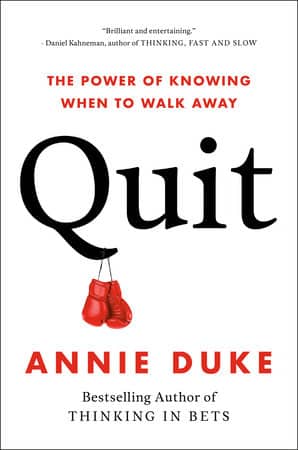Despite the title, I’m not advocating for being a jerk, but I also think there are times when some hard truths that lead to hurt feelings can be a good thing. In Annie Duke’s excellent book “Quit“, she shares some insight on this from Daniel Kahneman:
When I asked Daniel Kahneman what he thinks the secret is to being a good quitter, he told me, “What everybody needs is the friend who really loves them but does not care much about hurt feelings in the moment.”
You break up with someone and, all of a sudden, your close friends tell you, “I thought you should have ditched them months ago.” Or you quit your job and people in your family say, “I could tell you were miserable. It sure took you a long time to figure that out.” Of course, when they tell us those things, we all have the same reaction: “If you knew that all along, why didn’t you say so earlier?” And the answer is always the same: “I didn’t want to hurt your feelings.” You can get over hearing that you should quit something. But if you spend months or years in a job or a relationship that’s not contributing to your long-term happiness, that’s time you can never get back.
Of course, being a jerk is easy to do and we’ve all seen it. I think this really goes back to Gary Vaynerchuk’s idea of “kind candor“. If you want to truly be a good friend to someone, finding ways to speak the truth to them is key, even if it hurts a bit.
We see this with governmental leaders quite a bit. We have some (most?) that surround themselves with people that always agree with them, regardless of whether it’s right or wrong. The best leaders are willing to surround themselves with smart people that are willing to tell them when they’re wrong.
Lincoln’s Cabinet
Abraham Lincoln was a great example of this. in an article from Prologue Magazine, author Ellen Fried explains his cabinet like this:
In 1860, prairie lawyer and former one-term congressman Abraham Lincoln stunned the country by prevailing over three prominent rivals—William H. Seward, Salmon P. Chase, and Edward Bates—to win the Republican nomination for President. Perhaps equally surprising was what Lincoln did after being elected President: He appointed all three rivals to his cabinet—Seward as secretary of state, Chase as secretary of the treasury, and Bates as attorney general.
Lincoln wanted to be the best president that he could, and that meant bringing on very smart men that would have no problem telling him in the truth in all circumstances. It worked out quite well for him.
I’m fortunate to have a business partner and team that aren’t afraid to tell me when I’m wrong, but I’m equally fortunate about the way they handle it. Treating others with kind candor is a great way to live life.




